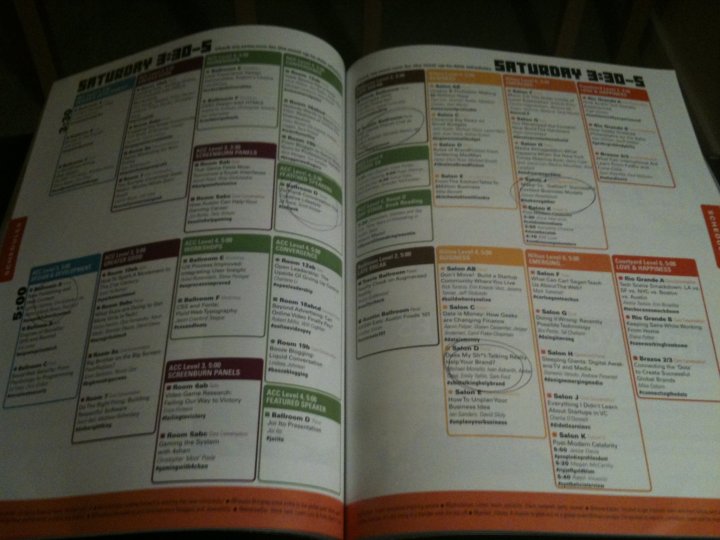So it seems that a while ago I lost my blogging mojo – turns out it was just on holiday… in Austin! It’s now back in my possession (for the time being) and over the next few days, I hope to have a few SXSW related blog posts for you.
SXSW is a massive festival in Austin, Texas which includes interactive, film and music events. I was there for the interactive element (12th – 16th March) with a great gang of people from the West Midlands and have come back with a few things to say about the experience. I thought a good place to start would be a list of the sessions I attended (with links to the event details on the SXSW website)…
Friday
- The Young and The Digital (Book Reading), S. Craig Watkins (details)
- Content Strategy: What’s in it for You?, Margot Bloomstein (details)
- DIY U: Edupunks, Edupreneurs and the Coming Transformation of Higher Education (Book Reading), Anya Kamenetz
- Understanding Content: The Stuff We Design For, Rachel Lovinger, Karen McGrane (details)
- Wave and Communication’s (R)Evolution: Better Than Being There, Jay Cuthrell, Daniel Raffel, Jared Goralnick, Casey Whitelaw (details)
Saturday
- The Era of Crowdsourcing: Guiding Principles, Jeffrey Kalmikoff, Scott Belsky (details)
- Universities in the “Free” Era, Glenn Platt, Peg Faimon (details)
- Mind Control: Psychology for the Web, Ben Scofield (details)
- Opening Remarks: Privacy and Publicity, Danah Boyd (details)
- BBC Digital Planet Live, Gareth Mitchell, Michelle Martin, Bill Thompson (details)
- New Publishing and Web Content, Jeffrey Zedelman, Erin Kissane, Lisa Holton, Mandy Brown, Paul Ford (details)
Sunday
- Africa 3.0: A Look at the Future of a Connected Africa (details)
- Influence and Innovate: Transforming Media Education, Cindy Royal, Tyson Evans (details)
- CrowdControl: Changing The Face of Media or Hype, Lila King, Pete Cashmore, Randi Zuckerberg, Joseph Kingsbury, Jason Rzepka (details)
- Sunday Keynote with Valerie Casey (details)
- Fans, Friends and Followers: Creating Your Own Cult (of the Non-Apocalyptic Variety), Scott Kirsner, Gary Hustwit (details)
- Improving Social Media with Live Streaming Video, Brad Hunstable USTREAM (details)
Monday
- Open Science: Create, Collaborate, Communicate, Tantek Celik, Natalie Villalobos, Ariel Waldman, Jessy Cowan-Sharp, Kirsten Sanford (details)
- Indirect Collaboration: Collective Creativity on the Web, Tom Lillis, Joe Alterio, Andrea Grover, Joshua Glenn, Riley Crane (details)
- Student Start-Ups: Entrepreneurship in the University, Hung Truong, Ellen Chisa, Ben Congleton, Rishi Naryan (details)
- Gary Vaynerchuk Presentation (details)
Tuesday
- UKTI Digital Mission Great British Breakfast
- Pervasive Games and Playful Experiences: Rendering the Real World, Simon Johnson, Clare Reddington, Nina Steiger, Duncan Speakman, Toby Barnes (details)
- The Shallows: What the Internet is Doing to Our Brains, Nicholas Carr (Book Reading) (details)
- Interactive Infographics, Eric Rodenbeck, Casey Caplowe, Ben Fry, Shan Carter (details)
(The ones in italics were the most enjoyable/relevant to me and I hope to elaborate on them in a future blog post)
It was a rather packed schedule with so many sessions to choose from for each time slot that it was often hard to narrow it down. Sometimes I would find myself sat in a presentation watching the tweets from another session and having a bit of session-envy! Fortunately much of the content should be available online for me to look up but it doesn’t compare to actually being there!
Anyway, I hope to spend a bit of time over the next couple of days hunting for links to presentations online, reflecting on some of the things I learnt, and writing a few things down including the social aspects and some general comments on SXSW and things I would do differently next time… so please visit again in a couple of days (and hope that my blogging mojo is still with me!)

